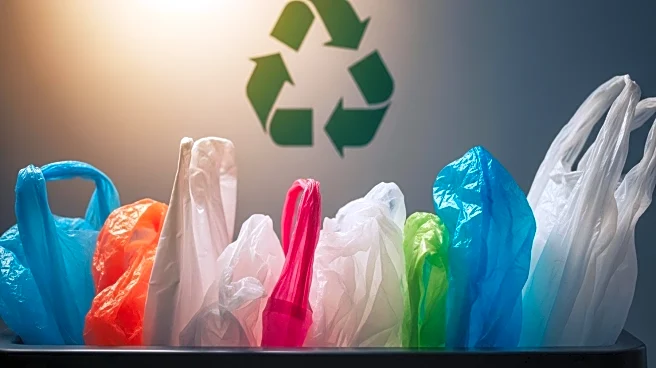What is the story about?
What's Happening?
Soft Plastics Stewardship Australia (SPSA) is set to replace the failed REDCycle program with a new industry-led recycling scheme. The initiative aims to manage approximately 300,000 tonnes of soft plastics that could be recycled annually but currently end up in landfills. The SPSA, comprising major supermarkets and manufacturers, plans to fund the collection, sorting, and processing of soft plastics through levies on manufacturers and retailers. The scheme has applied for approval from the Australian Competition and Consumer Commission (ACCC), with a decision expected in October. Despite the initiative, concerns have been raised about the potential for costs to be passed onto consumers and the limited capacity to recycle soft plastics back into packaging.
Why It's Important?
The introduction of the SPSA scheme is crucial in addressing Australia's significant plastic waste problem, which falls short of national recycling targets. By involving major industry players, the scheme aims to create a more equitable cost structure for recycling. However, the voluntary nature of the scheme and the potential for increased consumer costs have raised concerns among environmental groups. The success of the scheme could influence similar initiatives globally, highlighting the importance of industry collaboration in tackling environmental issues. The scheme's ability to recycle soft plastics into new products could also drive innovation in recycling technologies.
What's Next?
The ACCC's decision on the scheme's approval is anticipated in October, which will determine its implementation. The SPSA plans to expand its board and appoint an advisory council for independent oversight. The scheme's initial levy will be $160 per tonne, increasing to $200 per tonne by mid-2026, with annual reviews. The SPSA aims to gradually increase its recycling capacity, starting with local facilities and expanding over time. The scheme's success will depend on the participation of more companies and the development of end markets for recycled products.
Beyond the Headlines
The scheme's voluntary nature raises concerns about accountability and effectiveness. Critics argue that mandatory reporting requirements are necessary to prevent greenwashing. The potential for increased consumer costs and the limited capacity to recycle soft plastics into packaging are significant challenges. The scheme's focus on the second third of the plastics lifecycle highlights the need for solutions that address the entire lifecycle, including the reuse of recycled materials.















